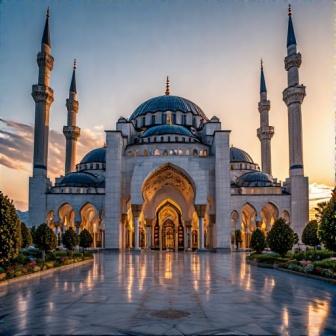The quest for justice is as old as humanity itself. In a world marked by growing inequality, discrimination, and social unrest, the teachings of Islam offer a comprehensive and timeless framework for social justice. Far from being a theoretical ideal, social justice in Islam is a lived reality, deeply rooted in the Qur’an, the Sunnah of Prophet Muhammad (peace be upon him), and the enduring legacy of his companions (may Allah be pleased with them).
The Essence of Social Justice in Islam
Social justice in Islam is not a peripheral concern but a central pillar of faith and practice. The Qur’an and Sunnah consistently emphasize the dignity of every human being, the imperative of fairness, and the responsibility to protect the vulnerable. Justice (‘adl) is one of Allah’s most beautiful names, and the Qur’an declares:
“Indeed, Allah commands justice and good conduct…”
(Qur’an 16:90)
This divine command is not limited to ritual worship but extends to every sphere of human interaction-family, community, economy, and governance. The Prophet Muhammad (PBUH) exemplified this holistic approach, building a society in Medina where justice, mercy, and mutual care were the hallmarks of daily life.
Foundational Quranic Verses on Social Justice
The Qur’an repeatedly affirms the equality and dignity of all people, regardless of race, ethnicity, or social status:
“O mankind, We have created you from male and female and made you peoples and tribes that you may know one another. Indeed, the most noble of you in the sight of Allah is the most righteous of you.”
(Qur’an 49:13)
This verse is a powerful declaration against all forms of racism, tribalism, and classism. It establishes piety and righteousness-not wealth, lineage, or power-as the true measure of human worth.
Another foundational verse states:
“Verily, God does not do even an atom’s weight of injustice.”
(Qur’an 4:40)
This uncompromising standard of justice is the foundation upon which all social relations must be built.
The Prophetic Model: Social Justice in Action
Prophet Muhammad (PBUH) did not merely preach justice-he lived it. His leadership in Medina was marked by the establishment of rights and responsibilities for all, including women, the poor, and religious minorities. The Prophet (PBUH) said:
“The faithful, in their love for one another, in their mercy for one another, and in their kindness toward one another, are like one body; when a member of it ails, all (the parts of) the body call one another (to share the pain) through sleeplessness and fever.”
(Sahih Muslim)
This hadith, with its vivid metaphor, illustrates the Islamic ideal of a society bound by empathy, solidarity, and mutual aid.
The Prophet’s (PBUH) concern for neighbors, regardless of their faith, is also well-attested. Ibn Umar (RA) narrated:
“Jibril (Gabriel) kept on recommending me about treating the neighbors kindly and politely, so much so that I thought that he would order me to make them as my heirs.”
(Sahih Bukhari, Hadith No. 6015)
This teaching underscores the universal scope of Islamic social justice-it is not confined to Muslims but extends to all of humanity.
Key Principles of Islamic Social Justice
Equality and Human Dignity
Islam unequivocally affirms the equality of all people. The Prophet Muhammad (PBUH) declared in his Farewell Sermon:
“An Arab has no superiority over a non-Arab, nor does a non-Arab have any superiority over an Arab; a white has no superiority over a black, nor does a black have any superiority over a white-except by piety and good action.”
(Musnad Ahmad, authentic chain)
This declaration, made over 1,400 years ago, remains a rallying cry against all forms of discrimination.
Justice as a Divine Command
Justice is not optional in Islam-it is an obligation. Allah commands:
“O you who have believed, be persistently standing firm in justice, witnesses for Allah, even if it be against yourselves or parents and relatives…”
(Qur’an 4:135)
This verse calls believers to uphold justice, even when it is difficult or personally costly.
Collective and Individual Responsibility
Islamic social justice is both a personal and communal duty. The Qur’an describes the Muslim community as a “middle nation” tasked with upholding justice and bearing witness to truth:
“And thus We have made you a just community that you will be witnesses over the people…”
(Qur’an 2:143)
The Prophet (PBUH) reinforced this collective responsibility:
“Whoever wakes up and does not concern himself with the affairs of the Muslims is not one of them…”
(Al-Kafi, vol. 2, p. 164, authentic chain)[6]
Economic Justice and Welfare
Islamic social justice encompasses economic rights and obligations. The Qur’an commands:
“And establish prayer and give zakat…”
(Qur’an 2:110)
Zakat, the obligatory alms, is a cornerstone of the Islamic welfare system, ensuring that wealth circulates and the needs of the poor are met. The Prophet (PBUH) said:
“On every Muslim there is enjoined (a compulsory) Sadaqa (alms).”
(Sahih Bukhari, Hadith No: 6022)
Freedom of Conscience
Islam affirms the right of every individual to freedom of belief:
“There shall be no compulsion in [acceptance of] the religion.”
(Qur’an 2:256)
This principle is foundational for any just and pluralistic society.
Mutual Responsibility and Solidarity
The concept of farḍ kifāyah (collective obligation) means that the community as a whole is responsible for eradicating injustice and supporting the vulnerable. This is complemented by farḍ ʿayn (individual obligation), which calls every Muslim to personal action for justice.
Addressing Common Questions About Islamic Social Justice
How does Islam define social justice?
Islamic social justice is the fair and equitable treatment of all people, protection of rights, elimination of oppression, and the establishment of a society where everyone’s basic needs are met, regardless of background.
What are the practical steps a Muslim can take to promote social justice?
Muslims are encouraged to speak out against injustice, give charity, support the oppressed, and work for systemic change through both individual and collective action.
Does Islam address economic inequality?
Yes, Islam mandates zakat and sadaqah (charity), prohibits exploitation, and encourages the ethical distribution of wealth to ensure that no one is left destitute.
How does Islam view activism and protest?
Islamic teachings support standing up for justice and the rights of the oppressed, provided it is done ethically and peacefully. The Prophet (PBUH) said:
“Whoever among you sees an evil, let him change it with his hand; if he cannot, then with his tongue; and if he cannot, then with his heart-and that is the weakest of faith.”
(Sahih Muslim)
Are there differences among scholars regarding the application of social justice principles?
While the core principles are agreed upon, scholars may differ on the best methods for implementation, especially in complex modern contexts. However, the obligation to pursue justice is undisputed in mainstream Islamic thought.
The Legacy of the Prophet (PBUH) and the Companions (RA) in Social Justice
The Prophet Muhammad (PBUH) and his companions (RA) established a society in Medina that set new standards for justice, welfare, and inclusion. The Muwakha (brotherhood) between the Muhajirun and Ansar is a prime example of economic and social solidarity. The Prophet (PBUH) also entered into treaties with non-Muslims, ensuring their rights and safety, and consistently advocated for the fair treatment of women, children, and slaves.
Companions like Umar ibn al-Khattab (RA) were known for their uncompromising commitment to justice. When a Coptic Christian was wronged by the son of an Egyptian governor, Umar (RA) held the governor’s son accountable, famously declaring, “Since when have you enslaved the people when their mothers bore them free?”
Contemporary Relevance: Applying Islamic Social Justice Principles Today
In the 21st century, Muslims face new challenges-systemic racism, economic disparity, environmental degradation, and political oppression. The Islamic mandate for justice is as urgent now as ever.
Muslims are called to:
- Stand against all forms of discrimination and racism, drawing inspiration from the Prophet’s (PBUH) Farewell Sermon and the Qur’anic vision of human equality.
- Advocate for economic justice by supporting fair wages, ethical business practices, and robust welfare systems.
- Protect the environment as part of their role as khalīfa (stewards) of the earth.
- Build coalitions with people of all faiths and backgrounds to fight injustice and promote the common good.
Islamic activism is not limited to protests or charity-it includes education, policy advocacy, community organizing, and the pursuit of systemic change. Every Muslim, regardless of age or circumstance, can play a role in advancing justice.
Practical Guidance for Modern Muslim Activists
- Begin with sincere intention (niyyah) and seek Allah’s pleasure in all efforts.
- Educate yourself about the issues affecting your community and the world.
- Collaborate with others, including non-Muslims, who share a commitment to justice.
- Use peaceful, ethical means to advocate for change.
- Balance activism with personal spiritual growth, remembering that justice begins with the self.
Scholarly Perspectives and Areas of Debate
Mainstream Islamic scholarship upholds the imperative of social justice, but there is ongoing discussion about the best means to achieve it in modern societies. Some scholars emphasize gradual, grassroots reform, while others advocate for more direct political engagement. There is also debate about the application of certain economic policies or the role of the state in enforcing justice. Despite these differences, the foundational commitment to justice, compassion, and human dignity is universal[4][5][6].
Key Takeaways
Islamic principles of social justice are timeless and transformative. They call every believer to uphold the dignity of all people, to fight oppression, and to build societies rooted in fairness, compassion, and solidarity. The Qur’an and Sunnah provide a comprehensive blueprint for justice that addresses both spiritual and material needs.
As Allah says:
“O you who have believed, be persistently standing firm in justice…”
(Qur’an 4:135)
Let us strive to embody these principles in our daily lives, our communities, and our activism. The challenges are great, but the promise of justice is greater. As inheritors of this prophetic legacy, we are called not only to believe in justice but to make it a living reality for all.
May Allah grant us the courage, wisdom, and perseverance to uphold justice in all that we do, and may our efforts be a source of mercy and benefit for humanity.







